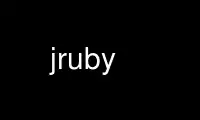
This is the command jruby that can be run in the OnWorks free hosting provider using one of our multiple free online workstations such as Ubuntu Online, Fedora Online, Windows online emulator or MAC OS online emulator
PROGRAM:
NAME
jruby — Interpreted object-oriented scripting language
SYNOPSIS
jruby [--copyright] [--version] [-Sacdlnpswvy] [-0[octal]] [-C directory] [-F pattern]
[-I directory] [-K c] [-T[level]] [-e command] [-i[extension]] [-r library]
[-x[directory]] [--] [program_file] [argument ...]
DESCRIPTION
Jruby is a 100% pure-Java implementation of Ruby, an interpreted scripting language for
quick and easy object-oriented programming. It has many features to process text files and
to do system management tasks (as in Perl). It is simple, straight-forward, and extensible.
OPTIONS
Ruby interpreter accepts following command-line options (switches). They are quite similar
to those of perl(1).
--copyright Prints the copyright notice.
--version Prints the version of Ruby interpreter.
-0[octal] (The digit “zero”.) Specifies the input record separator ($/) as an octal
number. If no digit is given, the null character is taken as the separator.
Other switches may follow the digits. -00 turns Ruby into paragraph mode.
-0777 makes Ruby read whole file at once as a single string since there is no
legal character with that value.
-C directory Causes Ruby to switch to the directory.
-F pattern Specifies input field separator ($;).
-I directory Used to tell Ruby where to load the library scripts. Directory path will be
added to the load-path variable ($:).
-K kcode Specifies KANJI (Japanese) encoding.
-S Makes Ruby use the PATH environment variable to search for script, unless if
its name begins with a slash. This is used to emulate #! on machines that
don't support it, in the following manner:
#! /usr/local/bin/ruby
# This line makes the next one a comment in Ruby \
exec /usr/local/bin/ruby -S $0 $*
-T[level] Turns on taint checks at the specified level (default 1).
-a Turns on auto-split mode when used with -n or -p. In auto-split mode, Ruby
executes
$F = $_.split
at beginning of each loop.
-c Causes Ruby to check the syntax of the script and exit without executing. If
there are no syntax errors, Ruby will print “Syntax OK” to the standard
output.
-d
--debug Turns on debug mode. $DEBUG will be set to true.
-e command Specifies script from command-line while telling Ruby not to search the rest
of arguments for a script file name.
-h
--help Prints a summary of the options.
-i extension Specifies in-place-edit mode. The extension, if specified, is added to old
file name to make a backup copy. For example:
% echo matz > /tmp/junk
% cat /tmp/junk
matz
% ruby -p -i.bak -e '$_.upcase!' /tmp/junk
% cat /tmp/junk
MATZ
% cat /tmp/junk.bak
matz
-l (The lowercase letter “ell”.) Enables automatic line-ending processing,
which means to firstly set $\ to the value of $/, and secondly chops every
line read using chop!.
-n Causes Ruby to assume the following loop around your script, which makes it
iterate over file name arguments somewhat like sed -n or awk.
while gets
...
end
-p Acts mostly same as -n switch, but print the value of variable $_ at the each
end of the loop. For example:
% echo matz | ruby -p -e '$_.tr! "a-z", "A-Z"'
MATZ
-r library Causes Ruby to load the library using require. It is useful when using -n or
-p.
-s Enables some switch parsing for switches after script name but before any
file name arguments (or before a --). Any switches found there are removed
from ARGV and set the corresponding variable in the script. For example:
#! /usr/local/bin/ruby -s
# prints "true" if invoked with `-xyz' switch.
print "true\n" if $xyz
On some systems $0 does not always contain the full pathname, so you need the
-S switch to tell Ruby to search for the script if necessary. To handle
embedded spaces or such. A better construct than $* would be ${1+"$@"}, but
it does not work if the script is being interpreted by csh(1).
-v
--verbose Enables verbose mode. Ruby will print its version at the beginning, and set
the variable $VERBOSE to true. Some methods print extra messages if this
variable is true. If this switch is given, and no other switches are
present, Ruby quits after printing its version.
-w Enables verbose mode without printing version message at the beginning. It
sets the $VERBOSE variable to true.
-x[directory] Tells Ruby that the script is embedded in a message. Leading garbage will be
discarded until the first that starts with “#!” and contains the string,
“ruby”. Any meaningful switches on that line will applied. The end of
script must be specified with either EOF, ^D (control-D), ^Z (control-Z), or
reserved word __END__. If the directory name is specified, Ruby will switch
to that directory before executing script.
-y
--yydebug Turns on compiler debug mode. Ruby will print a bunch of internal state
messages during compiling scripts. You don't have to specify this switch,
unless you are going to debug the Ruby interpreter.
Use jruby online using onworks.net services
